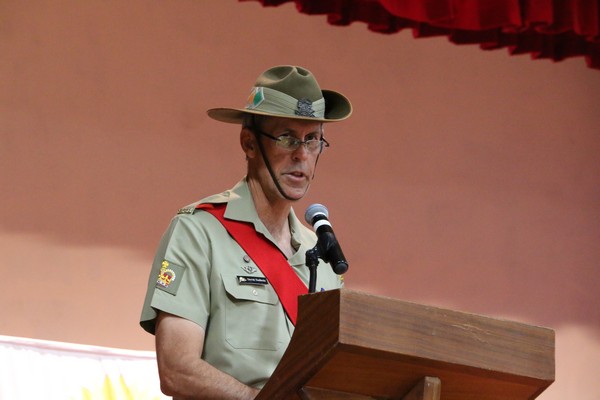The seventy-fifth anniversary of the first bombing of Darwin in northern Australia was commemorated at the annual service held in the Ian Maroske Hall at Horsham College on Monday morning.
The Dimboola Memorial Secondary College Captains Remi Kuhne and Kynan Clarke were a part of the official party at the service, along with Rebekah Albrecht. Rebekah is in Year 10 and will tour Darwin and Singapore later this year after receiving the Premier's Spirit of Anzac Prize.
Kynan introduced the guest speaker and Remi read a poem adapted from 'A special thanks from an Anzac's Kid'.
Above - Kynan Clarke, Rebekah Albrecht and Remi Kuhne with Darwin Defender Frank Fischer
Other speakers included Horsham College Captains Kessia Peterson and John Paul Macalinga, Horsham Rural City Council Mayor Councillor Pam Clarke and St Brigid's College students Annabella Fort and Kyra Clarke.

The guest speaker was Warrant Officer David Sudholz (above) who is the nephew of one of the original Darwin defenders, Bob Sudholz, who passed away last year.
This address included a brief history of the 19th Light Horse Machine Gun Regiment which was reformed in the Wimmera and transferred north which resulted in over 1,000 men from the Wimmera being in Darwin at the time of the first attacks.
The service concluded with a wreath laying ceremony was conducted by Horsham College Vice Captains Julia Gasparini and Luke Busbridge in which Kynan and Remi participated.
Private Jonathan Spence recited the "Ode to the Fallen' and Barry Whitehead performed the "Last Post' and "Reveille'.
The Natimuk Brass Band provided the music for the hymns and the National Anthem.
The formalities concluded with the wreaths being laid at the foot of the tree in the grounds of the Horsham College that is a descendent of the Lone Pine from Gallipoli.
The service in Horsham forms an important part of the commemorations of the bombing of Darwin due to the large number of recruits from the Wimmera and the significant role they played in repelling these attacks.
Darwin endured a total of 64 air raids by the Japanese in the eighteen months following the first one on the 19th of February 1942. Other towns in northern Australian were also bombed during this time.
The exact number of casualties is not known, but the estimated of the deaths range from 243 to around 1,100, with many hundred more injured.
This was the first time that Australian soil had been attacked by foreign forces.
|





